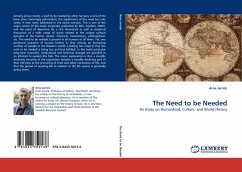
The Need to be Needed
An Essay on Humankind, Culture, and World History
Versandkostenfrei!
Versandfertig in 6-10 Tagen
44,99 €
inkl. MwSt.

PAYBACK Punkte
22 °P sammeln!
Among all our needs, a wish to be needed by other humans is one of the basic ones. Seemingly self-evident, the significance of this need has only rarely, if ever, been addressed in the social sciences. This is one of the major tenets of this book (originally published by SNS, Sweden, 2005), and the point of departure for a rich theoretical as well as empirical discussion of a wide range of issues related to the unique cultural dynamic of the human society: historical, evolutionary, philosophical, etc. The need to be needed is present in all humans of all times. Yet, one profound outcome of hum...
Among all our needs, a wish to be needed by other humans is one of the basic ones. Seemingly self-evident, the significance of this need has only rarely, if ever, been addressed in the social sciences. This is one of the major tenets of this book (originally published by SNS, Sweden, 2005), and the point of departure for a rich theoretical as well as empirical discussion of a wide range of issues related to the unique cultural dynamic of the human society: historical, evolutionary, philosophical, etc. The need to be needed is present in all humans of all times. Yet, one profound outcome of human history is, that among an increasing number of people in the Western world, a feeling has crept in that the wish to be needed is being less and less fulfilled. In this book particular long-term economic, institutional and technical changes are specified in an attempt to explain this fate. The major explanation is that a steadily declining minority of the population devotes a steadily declining part of their life-time to the procuring of food and other necessities of life, and that the period of working-life in relation to the life course is gradually going down.












